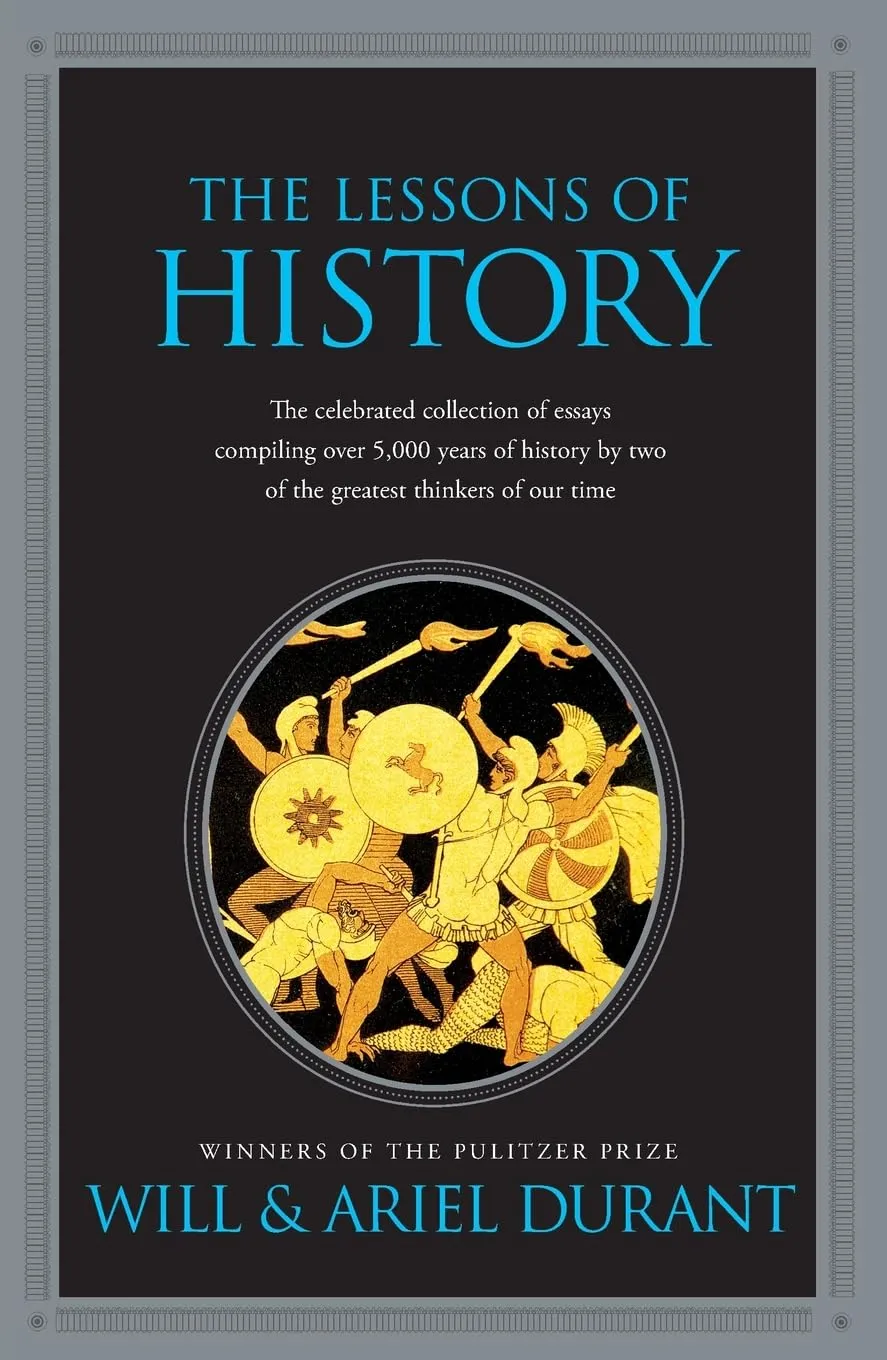About this book
Five Key Takeaways
- History requires humility due to incomplete knowledge.
- Moral codes evolve with society's changing needs.
- Religion provides social stability and moral guidance.
- Economic forces drive historical change and societal evolution.
- Civilizations experience cycles of birth, growth, and decline.
-
History Is Built on Uncertainty
Our understanding of history is incomplete because evidence is often conflicting or shaped by personal biases.
This means historical conclusions always contain uncertainty, as they reflect the perspectives of historians interpreting incomplete records.
History is less a science and more an art, an attempt to impose order on chaos while acknowledging the limitations of human understanding (Introduction).
For example, rapid societal changes and chance events often blur historical trajectories, challenging our ability to infer future trends.
In practice, this uncertainty means we can learn from history, but we must accept the tentative nature of our interpretations.
Consequently, engaging with history cultivates humility and patience, as it forces us to confront different eras and worldviews.
This humbling process deepens self-awareness and teaches us to view current events in a broader, historical context.
The result is a balanced perspective, where uncertainty in history mirrors life’s complexities, fostering adaptability to change.
-
Morality Evolves with Economics
Moral codes change because they’re shaped by the economic structures societies are built on, making them adaptable to new realities.
For instance, the communal dynamics of hunter-gatherers rewarded aggression while agricultural societies valued diligence and familial stability.
This economic foundation creates tension during major transitions, like the industrial era, when traditional values often clash with evolving needs.
As society shifts from rural to urban living, moral codes built on family cohesion weaken, creating new ethical challenges.
The authors argue that cultural critiques of moral “decline” often overlook how such changes reflect broader historical adaptations (Chapter 4).
History reveals that moral shifts are not inherently destructive. Many advanced societies flourished amidst significant moral recalibrations.
For example, periods of “moral decay,” such as Greece and Rome’s classical eras, fostered immense intellectual and cultural achievements.
This suggests moral evolution, rather than a downward spiral, is part of humanity’s process of progress and survival.
-
Recognize Religion’s Role in Stability
Religion often anchors society by creating moral frameworks and offering hope to counter despair during unstable times.
To understand its deeper role, analyze how religions connect personal values to a sense of collective, divine purpose across history.
Historically, religious teachings helped contain societal chaos, mitigate class conflicts, and shape laws rooted in shared ethical codes.
They achieved this by tempering inequality with promises of cosmic justice, which aided social harmony and reduced fragmentation.
By respecting religion’s social function, even skeptics can appreciate its cultural and ethical contributions (Chapter 5).
This perspective fosters a more balanced approach to debates over secularism, recognizing the risks of moral vacuums.
Taking religion’s stabilizing legacy into account enriches dialogue about how it might adapt to modern values while preserving unity.
-
Economics Drives Historical Change
Economic forces are central to shaping civilizations, from the rise of wealth-driven empires to resource-fueled conflicts like the Crusades.
Economic ambitions consistently influence political, cultural, and religious systems, underscoring their interconnected nature (Chapter 7).
For instance, industrial wealth empowered the middle classes to assert democratic power, altering societal hierarchies.
This fact reveals that revolutions and political reforms, often seen as ideological, are deeply rooted in material needs and wealth distribution.
On a broader scale, economic stability fosters creativity and intellectual progress, as seen during periods like the Renaissance.
The downside of unchecked economic power often includes inequality and unrest, sparking cycles of reform or revolution.
This cyclical nature teaches us that managing wealth distribution is crucial to preserving social harmony and sustainable development.
Understanding this economic foundation offers insights into current challenges, from global inequality to environmental resource management.
-
Socialism Isn’t a Perfect Alternative
While socialism aims to correct inequality, historical attempts have often fallen short due to corruption and inefficiency.
Regimes like the Incas or Ptolemaic Egypt offered stability but struggled to accommodate individual freedoms and innovation.
The authors argue that balancing capitalism’s creativity with socialism’s regard for equity yields better outcomes than adopting extremes (Chapter 8).
For instance, hybrid systems with strong safety nets preserve productivity while addressing inequalities caused by free markets.
Durants suggest reconciling socialist principles with the need for profit-driven incentives to sustain functioning economies.
Examples from history show that overly centralized economies falter when bureaucracy stifles adaptability, reinforcing the need for moderation.
This balance presents a middle path where freedom and responsibility coexist, creating dynamic yet just societies.
-
Prepare for Cycles of Rise and Decline
Civilizations follow natural cycles, rising, flourishing, and eventually declining due to internal and external challenges.
Recognize that environmental shifts, economic failures, or leadership struggles often trigger these transitions.
Studying historic patterns teaches us to monitor factors like inequality and cultural disunity as signs of potential decline.
Focus on fostering adaptability, long-term leadership vision, and cultural engagement within society to counter periods of stagnation.
This proactive approach can extend societal longevity and mitigate the risks associated with inevitable challenges (Chapter 11).
The benefit lies in preserving cultural legacies and ensuring that civilizations evolve gracefully rather than collapse abruptly.
However, ignoring these lessons risks repeating history’s cycles and losing societal cohesion to preventable causes.
-
War Shapes Human Development
War has been a constant in human history, driven by competition for resources, power, and survival at the state level.
This persistence stems from human instincts like pride and acquisitiveness, which prioritize conflict over cooperation (Chapter 10).
For example, wars like WWII advanced technology but also devastated communities, reflecting its dual role as destruction and catalyst.
Understanding war as a historical constant helps illuminate both its costs and its contributions to civilization’s evolution.
However, failure to prioritize diplomacy risks catastrophic consequences, especially as modern warfare threatens global annihilation.
Acknowledging this push-and-pull reinforces the urgency of international frameworks to promote peace through lasting strategies.




















